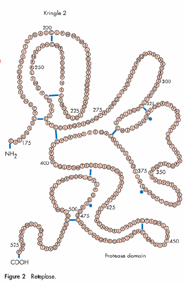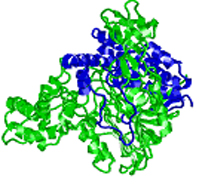| | Biotechnology Group | | |
 | Researches of our group are focused on different area of molecular biotechnology with the goal to develop innovative biological tools for diagnosis, treatment and prevention of human diseases. Our lab is well-equipped for research on recombinant DNA technology such as cloning and Expression facilities, DNA and protein analysis, purification and tests design and developments. |
Current projects of laboratory are focused on:
1) Development of recombinant therapeutics and Diagnostics
2) Immunotoxins
3) Genotyping and identification of SNPs and mutations linked to diseases
4) New vaccine candidates against infectious Diseases, |
| Immunotoxin therapy: Immunotoxins are composed of an antibody fragment or a growth factor linked to a toxin, such as Pseudomonas aeruginosa exotoxin A or diphtheria toxin. The immunotoxin binds to a surface antigen on a cancer cell; internalize into the target cells and the enzymatic fragment of the toxin translocates to the cytosol. In the cytosol, the toxin exerts its function to killing the cell. Immunotoxins derives their potency from the toxin and their specificity from the antibody fragment. PE38 is a shortened version of pseudomonas aeruginosa exotoxin A. combination of PE 38 with antibodies against tumor specific molecules can target cancer cells and kill them while leave healthy cells unharmed. Our laboratory are involved in a project to produce recombinant PE38 toxin and combine rPE38 to anti-EGFR antibody to target cancers with High level expression of EGFR.
|  |
| Development of recombinant deletion mutant of tPA: The use of thrombolytic drugs has revolutionized the treatment of patients with acute myocardial infarction. Retavase is a third generation thrombolytic agents that were developed to avoid adverse reactions associated with other thrombolytics. Our group has a project for production of Retavase in a laboratory scale. The gene for human tPA were cloned and sequence related to the second, third and most part of first domain were deleted. The construct were expressed in E. coli and optimized purification and refolding of the recombinant protein is under investigation.
|
 | 
| | Penicillin G acylases Penicillin G acylase is commercially used to hydrolyze benzylpenicillin to phenylacetic acid and 6- aminopenicillaic acid (6-APA), which is a key intermediate in the synthesis of a large variety of penicillins. Penicillin G acylase have been isolated from different microorganism but researches still underway for obtaining enzyme with better characteristics such as superior Km values, temperature, pH stability and substrate specificity. Our laboratory uses PCR technique for screening for novel Penicillin G acylases from environmental and clinical samples using primers designed on conserved region of reported PGAs. Several PGA producing isolates have been collected and characterization of enzyme is under investigation. | 
The three-dimensional structure of heterodimeric penicillin G acylase from E. coli. | | 
| |
| |